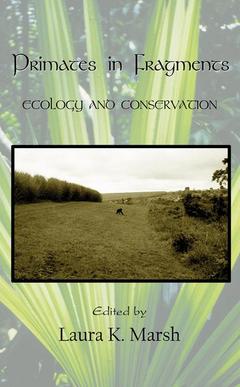Description
Primates in Fragments, Softcover reprint of the original 1st ed. 2003
Ecology and Conservation
Coordinator: Marsh Laura K.
Language: English
Subjects for Primates in Fragments:
Primates in Fragments
Publication date: 05-2013
404 p. · 17x24.4 cm · Paperback
Publication date: 05-2013
404 p. · 17x24.4 cm · Paperback
Primates in fragments: ecology and conservation
Publication date: 02-2003
428 p. · Hardback
Publication date: 02-2003
428 p. · Hardback
Description
/li>Contents
/li>Comment
/li>
This volume was created initially from a symposium of the same name presented at the International Primatological Society's XVIII Congress in Adelaide. South Australia. 6-12 January 2000. Many of the authors who have contributed to this text could not attend the symposium. so this has become another vehicle for the rapidly growing discipline of Fragmentation Science among primatologists. Fragmentation has quickly become a field separate from general ecology. which underscores the severity of the situation since we as a planet are rapidly losing habitat of all types to human disturbance. Getting ecologists. particularly primatologists. to admit that they study in fragments is not easy. In the field of primatology. one studies many things. but rarely do those things (genetics. behavior. population dynamics) get called out as studies in fragmentation. For some reason "fragmentation primatologists" fear that our work is somehow "not as good" as those who study in continuous habitat. We worry that perhaps our subjects are not demonstrating as robust behaviors as they "should" given fragmented or disturbed habitat conditions. I had a colleague openly state that she did not work in fragmented forests. that she merely studied behavior when it was clear that her study sites. everyone of them. was isolated habitat. Our desire to be just another link in the data chain for wild primates is so strong that it makes us deny what kinds of habitats we are working in. However.
The Nature of Fragmentation; L.K. Marsh. Section I: Genetics and Population Dynamics; L.K. Marsh. Effects of Habitat Fragmentation on the Genetic Variability of Silvery Marmosets, Mico Argentatus; E.C. Gonçalves, et al. Changes in Distribution of the Snub-Nosed Monkey in China. B. Li, et al. Analyses of the Hypothetical Population Structure of the Squirrel Monkey (Saimiri Oerstedii) in Panamá; A.R. Rodríguez-Vargas. Primate Survival in Community-Owned Forest Fragments: Are Metapopulation Models Useful amidst Intensive Use? C.A. Chapman, et al. Relationships between Forest Fragments and Howler Monkeys (Alouatta Palliata Mexicana) in Southern Veracruz, Mexico; E.M. Rodriguez-Toledo, et al. Primates of the Brazilian Atlantic Forest: The Influence of Forest Fragmentation on Survival; A.G. Chiarello. Dynamics of Primate Communities along the Santarém-Cuiabá Highway in South-Central Brazilian Amazonia; S.F. Ferrari, et al. Primates and Fragmentation of the Amazon Forest; K.A. Gilbert. Section II: Behavorial Ecology; L.K. Marsh. Impacts of Forest Fragmentation on Lion-Tailed Macaque and Nilgiri Langur in Western Ghats, South India; G. Umapathy, et al. Population Size and Habitat Use of Spider Monkeys at Punta Laguna, Mexico; G. Ramos-Fernández, et al. Changes in Forest Composition and Potential Feeding Tree Availability on a Small Land-Bridge Island in Lago Guri, Venezuela; M.A. Norconk, et al. Foraging Strategy Changes in an Alouatta Palliata Mexicana Troop Released on an Island; E. Rodríguez-Luna, et al. Dietary Flexibility, Behavioral Plasticity, and Survival in Fragments: Lessons from Translocated Howlers; S.C. Silver, et al. Howler Monkeys (Alouatta Pallicata Mexicana) as Seed Dispensers of StranglerFigs in Disturbed and Preserved Habitat in Southern Veracruz, Méexico; J.C. Serio-Silva, et al. How Do Howler Monkeys Cope with Habitat Fragmentation? J.C. Bicca-Marques. Section III: Conservation and Management; L.K. Marsh. Fragments, Sugar, and Chimpanzees in Masindi District, Western Uganda; V. Reynolds, et al. Shade Coffee Plantations as Wildlife Refuge for Mantled Howler Monkeys (Alouatta Palliata) In Nicaragua; C. McCann, et al. Effects of Habitat Fragmentation on the Cross River Gorilla (Gorilla Gorilla Diehli): Recommendations for Conservation; E.A. Eniang. Wild Zoos: Conservation of Primates in Situ; L.K. Marsh. Section IV: Integration and Future Directions. Fragmentation: Specter of the Future or the Spirit of Conservation; L.K. Marsh, et al. Suggested Reading. Index.
Includes supplementary material: sn.pub/extras
© 2024 LAVOISIER S.A.S.




